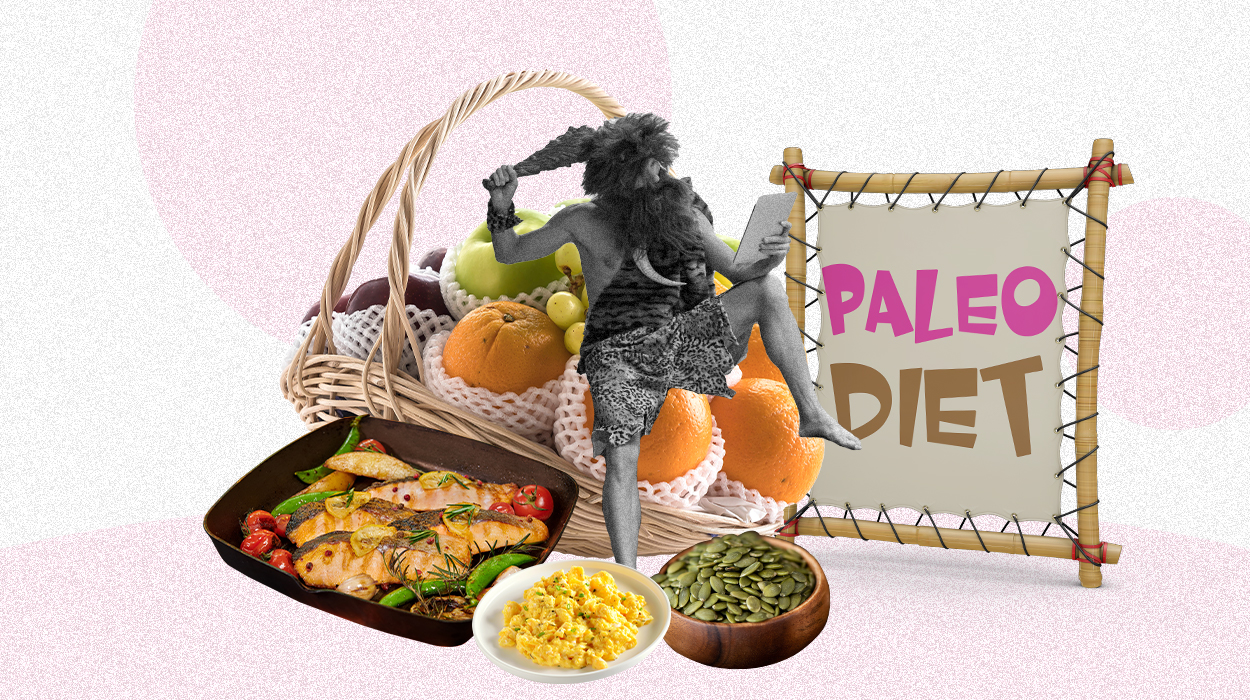 Expert's opinion
Expert's opinion
Expert's opinion
The article is a subjective view on this topic written by writers specializing in medical writing.
It may reflect on a personal journey surrounding struggles with an illness or medical condition, involve product comparisons, diet considerations, or other health-related opinions.
Although the view is entirely that of the writer, it is based on academic experiences and scientific research they have conducted; it is fact-checked by a team of degreed medical experts, and validated by sources attached to the article.
The numbers in parenthesis (1,2,3) will take you to clickable links to related scientific papers.
Paleo Diet 7-Day Meal Plan 2024: A Sample Menu For You

A paleo diet is a nutritional approach that emphasizes natural, unprocessed foods over modern or processed foods. The premise of the paleo diet is that modern humans can thrive by returning to the simple lifestyle of the Paleolithic era’s hunters and gatherers. What do you have in the paleo diet 7-day meal plan?
It is without a doubt that meal planning can assist you in adhering to your diet goals, including the paleo diet. Paleo meal prep doesn’t take much time or effort. With a weekly paleo meal planner, for example, it is possible to maintain high energy levels.
You just need to list the paleo items you need, buy only what you’ll use, and get your meals ready on time. This article will provide the information you need to start a paleo diet by reviewing its benefits, providing a sample 7-day meal plan, and outlining foods to avoid.
7-Day Paleo Diet Meal Plan
A 7-day Paleo Diet meal plan emphasizes whole, unprocessed foods with a focus on lean proteins, vegetables, fruits, and healthy fats. Featuring grass-fed meats, seafood, and plant-based fats, this dietary approach aligns with the Paleo principles, offering a nutrient-dense and satisfying menu for improved energy and overall well-being.
- Day 1: Nutrient-Rich Day Delight
- Day 2: Balanced Delights Day
- Day 3: Culinary Harmony Day
- Day 4: Fusion Wellness Day
- Day 5: Balanced Bliss Day
- Day 6: Wholesome Harmony Day
- Day 7: Flavorful Fusion Day
Paleo Diet 7-Day Meal Plan
When you’re just starting any diet, figuring out what to eat can be challenging. What kind of food or snack should you choose today?
Different versions of the paleo diet[1] likely arose because no one knew precisely about the paleo foods that cavemen ate. The route you decide to follow depends on your speculation and values surrounding food and health. Fortunately, here is a sample menu paleo diet plan you can use as a beginner!
Day 1: Nutrient-Rich Day Delight (Approx. 1900 Calories)
Enjoy a day filled with wholesome goodness. From a vibrant breakfast of fresh fruits and scrambled eggs to a lunchtime salad with fried sea bass and pumpkin seeds, followed by a grape-filled snack. End the day with the heartiness of roasted chicken stuffed with aromatic onions, carrots, and rosemary. This nutrient-rich day plan is designed for flavor and nourishment.
| Breakfast | |
| Fresh fruit | One cup |
| Scrambled eggs | Two eggs |
| Lunch | |
| Salad of mixed greens | Two cups |
| Fried sea bass | Six oz |
| Pumpkin seeds | One tablespoon |
| Olive oil dressing | One tablespoon |
| Snack | |
| Grapes | A handful (one cup) |
| Dinner | |
| Roasted chicken | One whole |
| Onions | One cup |
| Carrots | One cup |
| Rosemary | A few sprigs |
Day 2: Balanced Delights Day (Approx. 1800 Calories)
Begin your morning with the robust flavors of toasted pumpkin seeds, grilled tomatoes, and scrambled eggs with wilted spinach. For lunch, relish a mixed greens salad with the richness of leftover roast chicken, enhanced by a drizzle of olive oil dressing. A handful of pecans serves as a wholesome snack, leading to a dinner feast featuring oven-roasted salmon paired with steamed broccoli and coconut oil-infused asparagus. This well-rounded plan ensures a diverse array of nutrients and tastes, promoting a day of nourishment and enjoyment.
| Breakfast | |
| Toasted pumpkin seeds | One tablespoon |
| Grilled tomatoes | One medium |
| Scrambled eggs | Two eggs |
| Wilted spinach | One cup |
| Lunch | |
| Salad of mixed greens | Two cups |
| Leftover roast chicken | Four oz |
| Olive oil dressing | One tablespoon |
| Snack | |
| Pecans | A handful (one oz) |
| Dinner | |
| Salmon roasted in the oven | Six oz |
| Steamed broccoli | One cup |
| Asparagus in coconut oil | Four spears |
Day 3: Culinary Harmony Day (Approx. 1500 Calories)
Kickstart your morning with a hearty cauliflower hash, sausage, and eggs. For lunch, savor a refreshing chopped guacamole salad with a savory twist of cooked, crumbled bacon. A delightful snack awaits with the crisp sweetness of apples paired with creamy almond butter. Conclude your day with a nourishing chicken curry featuring a medley of broccoli, carrots, and snap peas. This balanced and flavorful plan ensures a day of satisfying and wholesome meals.
| Breakfast | |
| Cauliflower hash | One cup |
| Sausages | Two |
| Eggs | Two eggs |
| Lunch | |
| Chopped guacamole salad | Two cups |
| Bacon | Two slices |
| Snack | |
| Apples | One medium |
| Almond butter | Two tablespoons |
| Dinner | |
| Chicken curry | One cup |
| Broccoli | One cup |
| Carrots | One cup |
| Snap peas | One cup |
Day 4: Fusion Wellness Day (Approx. 1340 Calories)
Begin your morning with Sweet Potato Toast featuring tuna and avocado. Relish a slow-cooked delight of Curried Butternut Squash Soup for lunch. A handful of cherry tomatoes serves as a refreshing snack, leading to the evening satisfaction of Zoodles paired with sausage and tomato sauce. This fusion of flavors promises a day of wholesome and diverse culinary experiences.
| Breakfast | |
| Sweet potato | Six oz |
| Tuna | Four oz |
| Avocado | One half |
| Lunch | |
| Curried butternut squash soup | Eight oz |
| Snack | |
| Cherry tomatoes | One cup |
| Dinner | |
| Zoodles | Six oz |
| Sausages | Four oz |
| Tomato sauce | Four oz |
Day 5: Balanced Bliss Day (Approx. 1500 Calories)
Begin your morning with a nutritious combination of veggies, eggs fried in olive oil, and a piece of fruit. Savor a delightful olive oil-dressed chicken salad with a sprinkling of nuts for lunch. Snack on refreshing celery sticks with almond butter, leading to a dinner feast of meat, fruit salad, and cauliflower. This balanced journey promises a day of wholesome and varied flavors, contributing to your overall well-being.
| Breakfast | |
| Mixed vegetables | One cup |
| Egg | Two |
| Olive oil | One tablespoon |
| Fruit | One piece |
| Lunch | |
| Chicken salad | One cup |
| Nuts | One tablespoon |
| Olive oil | One tablespoon |
| Snack | |
| Celery sticks | One cup |
| Almond butter | Two tablespoons |
| Dinner | |
| Meat | Four oz |
| Fruit salad | One cup |
| Cauliflower | One cup |
Day 6: Wholesome Harmony Day (Approx. 1500 Calories)
Kickstart your morning with boiled eggs, bacon, and a delightful piece of fruit. Relish a satisfying lunch with leftover steak and vegetables. Nourish yourself in the afternoon with a handful of walnuts, leading to a wholesome dinner of oven-baked fish, veggies, and creamy avocado. This well-rounded plan promises a day of balanced nutrition, diverse flavors, and culinary satisfaction.
| Breakfast | |
| Boiled eggs | Two |
| Bacon | Two slices |
| Fruit | One piece |
| Lunch | |
| Steak | Six oz |
| Leftover vegetables | One serving |
| Snack | |
| Walnuts | One oz |
| Dinner | |
| Fish | Six oz |
| Veggies | One serving |
| Avocado | One serving |
Day 7: Flavorful Fusion Day (Approx. 1500 Calories)
Begin your day with the richness of leftover vegetables and salmon. Enjoy a satisfying lunch experience with a meat and veggie sandwich wrapped in a crisp lettuce leaf. Roasted peanuts make for a delightful afternoon snack, leading to a savory dinner featuring grilled chicken wings, veggies, and zesty salsa. This diverse plan promises a day of culinary delight, blending flavors for a satisfying and nourishing experience.
| Breakfast | |
| Vegetables | One serving |
| Salmon | Four oz |
| Lunch | |
| Meat | Four oz |
| Fresh veggies | One serving |
| Lettuce leaf | One |
| Snack | |
| Roasted peanuts | One oz |
| Dinner | |
| Chicken wings | Six oz |
| Vegetables | One serving |
| Salsa | One serving |
Why Should You Have A Paleo Diet Plan?
A paleo diet may be worth considering if you are attempting to improve your health and well-being. You may wish to transition to a paleo diet due to the following reasons:
- It promotes weight loss.
- It helps to boost energy.
- Improves heart health.
- It reduces the risk of diabetes.
- It reduces inflammation.
Benefits Of The Paleo Diet

What are the purported advantages of a paleo diet? As explained below, a paleo diet or paleo supplement encourages weight loss, increases energy, may enhance cardiovascular health,[2] prevents diabetes, and reduces inflammation.
Promotes Weight Loss
Because the paleo diet encourages whole foods over processed foods, most people feel more satisfied with this diet. Eating more nutrient-dense, paleo-friendly foods can keep your belly full longer, naturally supporting weight loss. This can support weight loss because you won’t always be hungry.
Helps To Boost Energy
If you follow a paleo diet, choosing foods that are low on the glycemic index or GI will help you avoid the energy crash that typically comes after eating foods with a high GI or that are high in sugar. Low GI foods allowed on paleo include many fruits (i.e., berries and melons) and non-starchy vegetables.
Improves Heart Health
Numerous studies have suggested that the paleo diet may benefit heart health.[2] This benefit could result from reduced high-fat processed foods and weight loss.
Reduces The Risk Of Diabetes
Insulin resistance is a risk factor for diabetes. According to some studies, the paleo diet leads to enhanced insulin sensitivity.[3] It can help improve a person’s insulin sensitivity, thus reducing the probability of developing diabetes. It can also assist individuals who already have diabetes in managing their symptoms.
Reduces Inflammation
Consuming paleo-friendly meals that are low in carbs and have a low GI can help minimize inflammation. This is especially true if you choose foods high in omega-3 fats, like fatty fish and avocados. The chances of developing type 2 diabetes and other health problems associated with excessive inflammation in the body are also reduced.
Foods To Avoid On Paleo Diet

Remember that paleo meals can be pretty healthful when done correctly. Therefore, focus on getting plenty of vegetables and healthy lean protein before deciding which foods you should cut out and which are good for you.
While adhering to a paleo diet, the following are some of the most essential foods to stay away from under any circumstance.
Sugar
Processed sugars are largely blamed for the obesity epidemic and its associated health implications.[3] Sugar and high-fructose corn syrup are common ingredients in various meals and beverages, including sodas, fruit juices, table sugar, candy, pastries, and even ice cream. These sugars elevate blood sugar levels, which leads to inflammation and weight gain.
Processed Foods
Many processed foods today have no resemblance to anything natural. This includes smoothies produced in blenders with many artificial additives added for flavor and french fries cooked in oil that shouldn’t be heated to such high temperatures. Because humans did not consume these foods during the Paleolithic period, they should be avoided on a paleo diet.
Grains
The paleo diet emphasizes eliminating cereal grains,[3] notably wheat and gluten. According to paleo proponents, anti-nutrients in grains such as gluten and lectins can induce gastrointestinal irritation and inflammation in some persons.
White rice is usually reserved for special occasions or used as a culinary accent. Only people who do not intend to lose weight or who regularly engage in physical activity should consider consuming it occasionally.
Artificial Sweeteners
Avoid artificial sweeteners on the paleo diet. Aspartame, sucralose, cyclamates, saccharin, and acesulfame potassium are all on this list. Most carbonated diet sodas also contain artificial sweeteners. These were not present in the Paleolithic era, and in modern times they have been shown to upset the gut microbiome, and some even alter glucose metabolism.[1]
Even though they may appeal as healthier because they are calorie-free, paleo meal plans still disapprove of using these sugar substitutes.
According to studies, artificial sweeteners are largely synthetic substances linked to several health issues.[4] For instance, they can alter gut microbes, wrecking the bacterial balance in the gut and disrupting the microbiome.
Artificial sweetener studies[5] on metabolic function, insulin resistance, and weight gain are ever-evolving.
Refined Oils
Industrial vegetable oils, including soybean, corn, and sunflower, contain omega-6 fatty acids and are heavily processed.
While some omega-6 fatty acids are required for optimum biological function, an imbalance between these and omega-3 fatty acids is a major contributor to inflammation[6] in modern diets.
On the other hand, the paleo diet promotes the consumption of heart-healthy oils such as olive and avocado.
The Takeaway
The paleo diet is based on the feeding practices of cavemen and other Paleolithic people. This eating plan emphasizes natural, unrefined foods while discouraging the consumption of refined carbs, sweets, and oils. Weight loss, increased metabolism, reduced inflammation, and improved gut health are all possible outcomes. However, more research is needed[7] before recommending positive health outcomes for this diet.
If you’re new to the paleo lifestyle, a paleo meal plan like the one above is a great way to ensure you eat various healthy foods. However, before making significant dietary adjustments, consult a physician or registered dietitian for personalized guidance.
+ 7 sources
Health Canal avoids using tertiary references. We have strict sourcing guidelines and rely on peer-reviewed studies, academic researches from medical associations and institutions. To ensure the accuracy of articles in Health Canal, you can read more about the editorial process here
- https://www.cell.com/cell/fulltext/S0092-8674(22)00919-9
- Ehsan Ghaedi, Mohammad Reza Mohammadi, Mohammadi, H., Nahid Ramezani-Jolfaie, Malekzadeh, J.M., Mozaffari-Khosravi, H. and Kwon, D.-S. (2019). Effects of a Paleolithic Diet on Cardiovascular Disease Risk Factors: A Systematic Review and Meta-Analysis of Randomized Controlled Trials. [online] 10(4), pp.634–646. doi:https://doi.org/10.1093/advances/nmz007.
- Małgorzata Jamka, Bartosz Kulczyński, Agata Juruć, Gramza-Michałowska, A., Stokes, C.S. and Walkowiak, J. (2020). The Effect of the Paleolithic Diet vs. Healthy Diets on Glucose and Insulin Homeostasis: A Systematic Review and Meta-Analysis of Randomized Controlled Trials. [online] 9(2), pp.296–296. doi:https://doi.org/10.3390/jcm9020296.
- Singh, A. and Singh, D. (2023). The Paleolithic Diet. [online] doi:https://doi.org/10.7759/cureus.34214.
- Sharma, A., S Amarnath, M Thulasimani and Ramaswamy, S. (2016). Artificial sweeteners as a sugar substitute: Are they really safe? [online] 48(3), pp.237–237. doi:https://doi.org/10.4103/0253-7613.182888.
- Simopoulos, A.P. (2016). An Increase in the Omega-6/Omega-3 Fatty Acid Ratio Increases the Risk for Obesity. [online] 8(3), pp.128–128. doi:https://doi.org/10.3390/nu8030128.
- https://www.ncbi.nlm.nih.gov/pmc/articles/PMC4997304/



